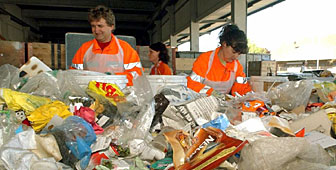
Waste disposal the Swiss way
Four out of five Swiss would be in favour of a tax on their rubbish bags, according to a new nationwide study.
The people of canton Vaud will be voting on Sunday on whether to introduce the tax, which is already commonplace in the German-speaking part of Switzerland.
The rubbish bag tax means that householders have to buy a coloured sticker from the local shop and place it on their rubbish bags – instead of paying the local authorities directly from their taxes.
It is a system widely in place in the German-speaking part of the country, but is not so common in French-speaking areas.
The survey, carried out by the Swiss Agency for the Environment, Forests and Landscape (SAEFL), is the first time that the effects of the tax have been studied on a nationwide-basis.
Hans-Peter Fahrni, in charge of the project at SAEFL, said the report should be completed and published next year. And he revealed some of the first results exclusively to swissinfo.
“We were very surprised to find out that more than 80 per cent of people using the rubbish bag tax were in favour of it,” said Fahrni.
“Our study also shows that the communes that have adopted the rubbish bag tax are better at separating their rubbish and there has been an increase in recyclable rubbish.”
The system provides an incentive to recycle because bottles, paper and other recyclable material can be disposed of free of charge.
Conditions for success
“But this success depends a lot on the conditions in which the tax is introduced,” Fahrni added.
This effectively means that any town or village adopting the practice must offer its residents enough places to dump or separate its rubbish.
“These waste disposal centres must be maintained by the communes,” Fahrni told swissinfo. “Otherwise you run the risk that people won’t do it.”
He also underlined the importance of the price of the tax, which he says should not cost more than two Swiss francs per 35-litre sack.
The ecological assessment of the rubbish bag tax also seems largely positive, says the SAEFL study.
Differences in French-speaking Switzerland
But French-speaking Switzerland remains hesitant about introducing the system.
In the canton of Fribourg, the levying of tax is obligatory and half of the levy is proportional to the amount of rubbish produced.
The German-speaking areas of canton Valais have adopted the rubbish bag levy but the French-speaking areas still pay tax to get rid of their waste.
Neuchâtel has decided to keep taxing households and the Genevan authorities are trying to encourage recycling but do not have the rubbish bag tax.
The people of Jura have refused such a tax, despite it being accepted by its cantonal parliament.
Principle of law
On Sunday, Vaud is to vote on the issue. The law on waste management, which is being put to the vote, enforces the principle of a tax.
But it leaves the decision on whether to have a rubbish bag tax or an inclusive tax up to the communes.
Whatever the result of the vote, Fahrni believes that the whole of Switzerland will sooner or later end up using one or the other of these taxes.
“It’s the Swiss parliament which wanted to enshrine the principle of the paying polluter into the law.”
swissinfo, Frédéric Burnand in Geneva (translated by Isobel Johnson)
The rubbish bag tax comes under the principle of the “paying polluter”, which is enshrined in federal law.
The tax helps to finance the disposal of rubbish.
It encourages people to separate and recycle their rubbish.
67% of Swiss use the system.

In compliance with the JTI standards
More: SWI swissinfo.ch certified by the Journalism Trust Initiative



































You can find an overview of ongoing debates with our journalists here . Please join us!
If you want to start a conversation about a topic raised in this article or want to report factual errors, email us at english@swissinfo.ch.